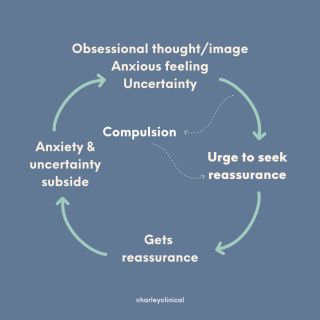OCD
Reassurance Seeking in OCD and How to Manage It
Reassurance seeking in OCD can feel like a trap that's hard to get out of.
Posted January 5, 2023 Reviewed by Michelle Quirk
Key points
- Seeking reassurance from others can be a key part of OCD.
- In the short term, getting reassurance can help reduce anxiety, but in the long term, it contributes to the maintenance of OCD.
- Encouraging support seeking rather than reassurance seeking may help reduce symptoms of OCD.
Although not exclusive to OCD, excessive reassurance-seeking (ESR) is a lesser-known feature of OCD. But it can often be one of the most debilitating symptoms of OCD and have disastrous consequences for relationships as those around the person with OCD become "recruited" into and trapped in the OCD cycle with their loved one.

ESR can take many different forms—the husband with contamination fears repeatedly asks his wife if his hands look clean, even though they are bleeding. Or the friend who needs you to tell her that she did not run anyone over when she drove somewhere. Regardless of what form excessive reassurance takes, for the OCD sufferer, it can often feel like another trap that OCD has set; another behaviour, alongside the compulsions, that feels very necessary and is hard to stop.
Why do people seek reassurance in OCD?
We all seek reassurance from others when we feel under threat or anxious or uncertain about something. It helps reduce the anxiety we feel when a trusted person tells us it will be OK. But in OCD, the reassurance is excessive. Cognitive-behavioural theories of OCD posit that ERS is primarily a safety-seeking behaviour and reduces a person's sense of threat and uncertainty in the short term. But this effect diminishes in the longer term and increases the urge to seek reassurance repeatedly when anxiety or obsessive thinking returns. Hence, a vicious reassurance cycle gets set up.
Engaging in ESR may also help an OCD sufferer feel that they have somehow transferred responsibility to another person (Kobori et al., 2017). For many people with OCD, alongside the typical overestimation of a perceived threat, inflated responsibility can be a central feature of the symptoms. Inflated responsibility is a belief that the person with OCD is responsible for preventing harm to themselves, loved ones, or other people.
What impact can excessive reassurance-seeking have on relationships?
Having a partner who repeatedly asks you for reassurance can be immensely frustrating and stressful. It can also be challenging for loved ones to understand the person's fears and obsessions, or they may even find them bizarre or nonsensical.
How can we support someone who seeks excessive reassurance?
Traditional psychological treatments have typically emphasised that people who experience OCD should stop seeking reassurance and that the family should ignore or withhold reassurance requests. This should, in theory, break the vicious cycle that is set up whereby the OCD sufferer has to seek reassurance to alleviate anxiety. But research has found that stopping/not reassurance-seeking can actually increase distress for the family member and produce negative emotional and behavioural responses from the OCD sufferer (Halldorsson et al., 2016).
An alternative approach is to help the person experiencing OCD seek support rather than reassurance (Neal & Radomsky, 2019). Receiving reassurance helps reduce the uncertainty someone is feeling—they need to check what they think is true/not true and therefore gain certainty to reduce anxiety. On the other hand, seeking support with difficult thoughts (obsessions), feelings (anxiety), and urges (to get reassurance and certainty) enables the person with OCD to learn to tolerate and manage more helpfully feelings of uncertainty and anxiety. So, some responses to reassurance seeking could be the following:
- I can see that you are really anxious about [feared consequence/obsessional thought]. But, remember, I am here for you.
- The reassurance seeking is showing up, isn't it? Shall we just notice that and think about what else might help you manage the anxiety?
- I know you want me to give you lots of reassurance right now, and I know it's hard. What might be a more helpful way of dealing with your anxiety right now? How can I help you with that?
- Are you asking me to reassure you? OK, I know that this is challenging for you. But, I wonder if you could do something else to cope with the anxiety? Shall we think together about what might help?
In these examples, the responses contain at least two of the following elements:
-
Noticing the person's distress or need to be reassured.
-
Naming the reassurance-seeking as an internal urge that is showing up.
-
Giving a sense of support and encouragement.
-
A question about what is going to be more helpful in enabling the person to manage their anxiety and distress, empowering them to seek an alternative behavioural response to the urge.
It is important to remember that such a response may not be helpful at times of very high anxiety, so a flexible approach is best. Sometimes giving reassurance may be the best thing to do at that moment. At other times, when there is not so much anxiety, trying out the responses above may be helpful. If the person is in psychological treatment for OCD, talking with their therapist about how best to respond to reassurance and coming up with a plan together will be important.
This post also appears on the Harley Clinical Psychology Web site.
References
Kobori, O., Salkovskis, P. M., Pagdin, R., Read, J. and Halldorsson, B. (2017) Carer's perception of and reaction to reassurance seeking in obsessive compulsive disorder. The Cognitive Behaviour Therapist, 10.
Halldorsson, B., Salkovskis, P. M., Kobori, O., & Pagdin, R. (2016). I do not know what else to do: Caregivers' perspective on reassurance seeking in OCD. Journal of Obsessive-Compulsive and Related Disorders, 8, 21–30.
Neal, R.L. & Radomsky, A. (2019). How Do I Say This? An Experimental Comparison of the Effects of Partner Feedback Styles on Reassurance Seeking Behaviour. Cognitive Therapy and Research, 1–11.




